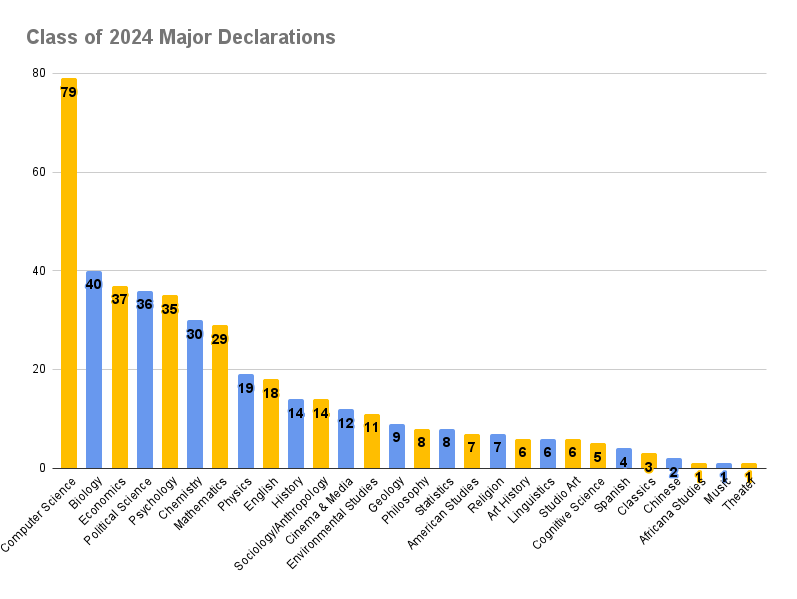It is now the third week of Spring Term, which means the yearly ritual of the sophomore class declaring their majors has come to an end. This marks the third class year that saw their sophomore spring affected by COVID-19 rules and regulations. The Class of 2024 is also the first to declare with no pre-COVID-19 classroom experience, a key difference between the last two years.
This time last year, the Class of 2023 had 458 then-sophomores declare a major, a dip from the Class of 2022’s 486 declarations largely due to students taking terms off for COVID-19 related reasons. This year, 448 sophomores picked their department, reflecting their reduced class size and increased number of off-cycle students.
Coming in at number one for the second year in a row is computer science with 79 majors. With an increase of nine majors compared to last year, the department continues to grow following the recent years’ trend. Sriya Konda ’24 pointed to a larger trend of computer science majors coming into their freshman year already decided.
“It wasn’t a hard decision for me. I knew since high school that I wanted to major in computer science.”
This was not necessarily the case for many other departments, particularly those in the humanities. Tori Aguado ’24, shared that she had “known what [her] major would be for a while,” but she still described declaring cinema and media studies as “a little scary because when you’re pursuing a major in the arts or humanities you get a lot of judgment from other people, so you have to be sure on what you want to do”.
William Phillips Longley ’24, another humanities major, originally struggled before deciding on philosophy. Still, he insists that his first five terms were instrumental in picking his department.
“It was a very hard decision and one that I still have a lot of ‘what if’s’ about,” Longley said. “I’m so thankful that Carleton gives us time to try out different classes before picking our major, but it still doesn’t seem like enough time.”
The biology department suffered the biggest loss, reporting 40 majors—27 less majors than the Class of 2023. It held on to its rank at number two but continued a larger stretch of bleeding numbers. Professor Dan Hernandez, chair of the biology department, said he could not chalk it up to a specific reason, but remote learning might have some incidence.
“The shift to remote classes in 2020-21 affected all departments and programs, but biology was unable to offer most of our labs in-person as well, which may have had some influence on the number of majors this year.”
Regarding learning during COVID-19, Soren Eversoll ’24, who declared English as his major, reflected on how it affected declarations.
“I think my first year affected the process in the sense that the classes I did take were mainly online, something that I think really affected the quality of the teaching and my ability to feel fully engrossed in what we were studying,” Eversoll said. “Maybe if more of my classes were in person, I would have felt a deeper connection to one of them and reconsidered my decision.”
Most sophomores agreed that ultimately it does not matter all that much. Aryan Arora ’24, a newly declared economics major, thinks the process is less about declaring and more about exploration.
“What is exciting is talking to professors, learning about disciplines and doing some soul-searching for what your calling is,” Arora said. “Declaring is just a formality.”










